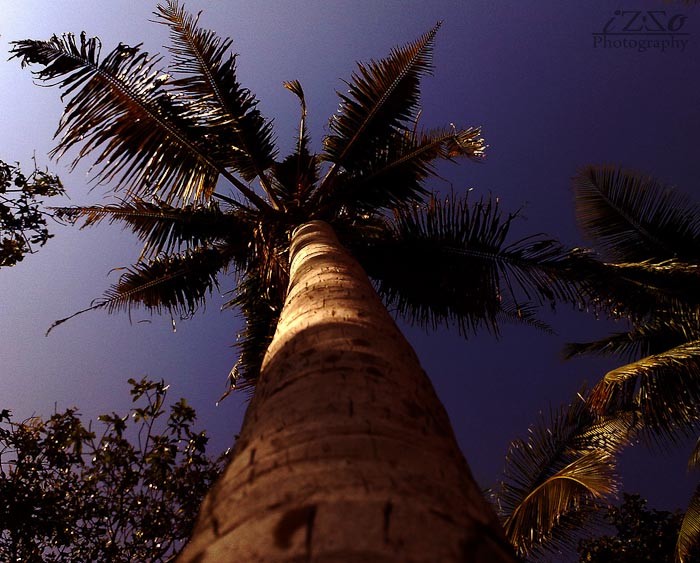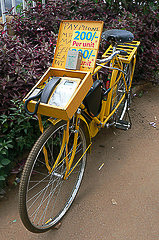10 Things You (Probably) Didn’t Know About Mobile Phones
Could YOU do without a mobile phone while travelling? Given 57% of women in America would (allegedly) rather use their smartphone than have sex, and Hong Kongers seem unable to do without at least two mobile phone contracts per person, it seems unlikely.
I’ve teamed up with the folk at GO-SIM.com, who provide prepaid SIM cards that work in an impressive 190 countries, to bring you a few things you (hopefully) don’t know about mobile phones around the world.

In the Middle East, Mobile Phone Masts Are Often Disguised as Giant Palm Trees
Other popular “disguises” elsewhere? Cactuses, pine trees, flagpoles, cypresses and crosses. In the UK, folk favour chimneys, drainpipes, church belfries, clocks and weather vanes.
It’s Illegal to Unlock a Mobile Phone in the US
The average cost of a smartphone in the US is over $500 – more than double the typical price in Asia-Pacific. But, since last year, it’s been illegal to unlock a new phone. In theory, offenders could be fined up to $500,000 and sent to jail for five years – hopefully, the law will change this year.
Data Roaming Can Cost More Than Your House
Two brothers managed to rack up $201,000 in roaming charges on a fortnight’s holiday in Canada, by texting and streaming video – on their sister’s bill. Meanwhile, one Briton received a bill for £20k after uploading photos to Facebook during a week’s holiday in Turkey. 
Phones Will Be Out by 2025
Futurologists believe that by 2025 most people will wear gadgets that allow them to connect to the internet, which will tell us helpful things like we need to take more exercise, or see a doctor. Scarily, we’ll also be monitoring what our kids are doing through similar sensors.
Possibly not in Uganda, where this creative solution comes from, though.
Over Half of American Women Would Rather Use Their Smartphone than Have Sex
Yep. I’d love to see how this survey question was framed, but offered the choice between sex and swiping at their phones, 57% of American women opted for their phones (perhaps not coincidentally, this is roughly the percentage of Americans who’ve broken up by text or social media). Meanwhile, 12% of Americans have taken their smartphone into the shower.
The Indonesian for Mobile Phone is “Happy”
… Well, HP (hand phone), actually – but it sounds like happy. The Chinese opt for 手机 (hand machine), the Finns for matkapuhelin (travel telephone) and the Maori for waea pukoro (pocket signal).
The World’s Fastest Touchscreen Texter is From Brazil
Time on your hands? There is a Guinness World Record for the world’s fastest touchscreen texter. Entrants have to type the following sentence with correct spelling, punctuation and capitalisation: “The razor-toothed piranhas of the genera Serrasalmus and Pygocentrus are the most ferocious freshwater fish in the world. In reality they seldom attack a human.”
Brazil’s Marcel Fernandes Filho, 17, managed it in 18.19 seconds (he was bored after destroying his computer in a tantrum).
The First Mobile Phone Appeared in 1973
It’s 41 years since the first mobile phone made its appearance. Not that it exactly took off. The DynaTac4000 weighed a hefty 1kg and had precisely 35 minutes battery life. The cost? $3995, or more than $20,000 today. This is Martin Cooper, who made the first ever mobile phone call, recreating it with the original brick.
China Mobile is the World’s Biggest Mobile Operator
There are 1,246,300,000 mobile phone subscriptions in China – the majority of which make over $90billion a year for China Mobile, the world’s biggest mobile operator. Across the border in Hong Kong, folk average more than 2 mobile phone contracts per head.
The First Text Messages Were 160 Characters Long
The first text message ever sent? “Merry Christmas” (on December 3, 1992). The engineer who created the SMS set a 160 character limit, long before Twitter, on the basis that any question you wanted to ask or statement you wanted to make could fit into that number of characters.
Image credits: Liulin / 柳林 | screen generation / 屏幕时代 by Tauno Tõhk / 陶诺, Kiwanja_Uganda_Bike by Ken Banks and Into thE Sky by Easa Shamih on Flickr’s Creative Commons. Dynatac4000 image via Wikimedia Commons.

The first time I saw palm tree cell phone towers was in the US over 15 years ago! 😀
Really?! I haven’t been in the US for AGES – must be ten years now – but I don’t remember seeing them there.
“…created the SMS set a 160 character limit, long before Twitter”
Oy, and how often do I wish for those 20 extra characters! 😉
Unbelievably, we haven’t got a mobile. And we still work on a desktop. Yes, we’re seriously old school.
I upgraded to a smartphone lately. THen lost the bloody thing. I tell you, once you’ve gone smart, you don’t look back.
A desktop, however, is impressively old school… Tell me you have something you use when you’re travelling…
These facts are interesting. Love the palm trees one!
Thank you!
How interesting! We travel with an iphone, but it doesn’t actually work for making calls haha. We just rely on the internet and skype. Not always convenient, but beats roaming charges for sure ;-P
It works until you’re in a country where everyone uses phones, and there’s sodall internet — the two situations tend to go together for obvious reasons…
Why would Americans want to throw people in jail over something as unlocking a phone? Aren’t their prisons overflowing already?
Those data roaming charges are pretty egregious too!
I don’t think anyone’s been jailed for it, mercifully – it’s an interpretation of copyright law that’s the issue. The fact remains that they could do. And, yes, data roaming charges can be ridiculous. We had someone in the UK who ran up £10k…
Thanks for sharing these interesting mobile phone facts. Personally, I prefer using my phone as little as possible. I spend long hours in front of a computer so there isn’t much need for all the functionality on a smartphone, although I’m a big fan of GPS.
It’s interesting to know that a lot of objects are disguises.
There’s a latecomer’s advantage among African countries. Some areas didn’t have to have landlines. They went directly to having mobile phones.
Yes! I love that about Africa. Have you heard about the Google-X balloon internet project? If it works, it should be hugely democratising – although putting more power in the hands of the Big G, which I’m not necessarily sure is a good thing.